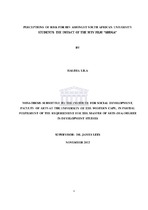Perceptions of risk for HIV amongst South African university students: the impact of the MTV film “Shuga”
Abstract
The Human Immunodeficiency Virus (HIV) and Acquired Immunodeficiency Syndrome (AIDS) epidemic continue to endanger the lives of many people in the world, particularly in developing countries like South Africa (UNAIDS, 2010). South Africa has the largest percentage of people living with HIV & AIDS in the world, with AIDS continuing to be the leading cause of death(UNAIDS, 2010). Yet, as Svenson et al., (1997), Cain, (2005), Shisana et al., (2009) and Kalichman et al., (2005) argue, in spite of the HIV epidemic, risky sexual behaviour has increased among young people. Problematically, youth in university environments are reported to be uninterested in hearing about HIV, claiming to be tired and bored with the subject (HEAIDS, 2010). They think they have sufficient knowledge on HIV transmission and prevention. Regardless of this claim, a high rate of new infections of HIV among youth continues (The South African Department of Basic Education Report, 2010). The main purpose of this study was to assess UWC students’ knowledge about HIV and their attitudes towards it, while investigating the impact of the MTV-produced Shuga film on the students’ self-perception of risk and their attitudes toward HIV. The study assesses the value of a follow-up conversation on the film after it is viewed by students.In order to identify respondents’ perceptions, the study used a qualitative approach using in-depth interviews and focus group discussions as main instruments and a quantitative approach using questionnaires as a main instrument. The study used a gender-balanced convenience sample of 40
undergraduate and post-graduate students selected from University of Western Cape campus. These respondents were later divided into four focus group discussions guided by semi-structured interviews. The study findings established that although students’ knowledge levels were very high for modes of transmission and prevention of HIV, they still had a poor perception of their own risk – a factor noted as a key need in HIV prevention by Douglas Kirby (2011).This study found that, prior to watching the MTV Shuga film, the level of students’ awareness of HIV issues as related to their own risk and health was at best inconsistent. While some held accurate knowledge of HIV and understood their own vulnerability, others saw it as someone else’s problem and had yet to personalise the disease in a manner that would increase their own awareness of risk. After viewing the MTV Shuga film, study data indicated a reasonable level of positive change in attitudes and risk perception among the 40 students. However, the data clearly indicated that the follow-up discussion sessions provoked more change in the students’ attitudes and perceptions of risk than the film on its own. The study therefore suggests the importance of discussion sessions that follow up on edutainment media pieces attempting to promote positive behavioural change vis-à-vis HIV. While the study did not focus in depth on why the follow-up discussion sessions had a higher impact than film-viewing alone, the discussion sessions allowed students to personalise the content of the Shuga film, sharing with each other how they identified with various characters, situations and behaviours. Shuga became ‘real’ through the personal discussions between students, and the film’s intent to prompt positive change was further supported.

